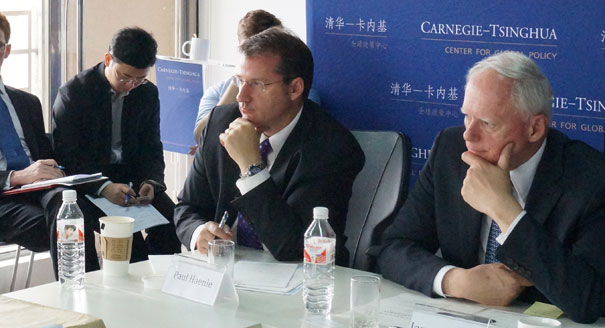Registration
You will receive an email confirming your registration.
As the United States decreases its involvement in Afghanistan and Iraq, the country’s future role in the Middle East has dominated discussion in both Washington and internationally, especially in the context of the U.S. rebalancing policy toward Asia.
The Carnegie-Tsinghua Center for Global Policy and the Royal Norwegian Embassy in Beijing hosted former U.S. ambassador James F. Jeffrey to discuss the U.S. posture and strategy in the Middle East. Jeffrey is a Philip Solondz distinguished visiting fellow at The Washington Institute and served former U.S. president George W. Bush as an assistant to the president and U.S. deputy national advisor. Carnegie-Tsinghua’s Paul Haenle moderated the event.
Instability and Regional Implications
While overall regional instability is a concern for the United States, the most pressing issues for U.S. policy in the Middle East are Iran and Syria, Jeffrey asserted.
- Historical Instability: Jeffrey explained that the Middle East has a long history of turbulence and instability stemming from the collapse of the Ottoman Empire, the region’s swift colonization thereafter, and the Cold War. He noted that for the past half-century, the region has seen war after war, at least seven Israeli conflicts, and numerous U.S. and international interventions, such as the first Gulf War.
- Syrian Instability: Syria poses an imminent threat to the region’s stability because of the possibility of the instability and violence spreading while the death tolls and number of displaced people continues to rise, Jeffrey stated. While it is clear that the Obama administration does not want to use force, Jeffrey explained that Washington still insists on a Syrian future without Bashar al-Assad as the president. Jeffrey further noted that the “pendulum” of victory in Syria was currently swinging against the resistance, and that Assad’s eventual removal was not inevitable.
- Iran: As the state most inimical to the U.S. foreign policy objective of nuclear nonproliferation, Jeffrey noted that Iran could be a huge destabilizing factor in the region. Jeffrey said that the United States does not pursue a policy of regime change in Iran. However, Jeffrey described Iran as maintaining the drive to control the region as a hegemonic power and acquire nuclear capabilities.
U.S. World View
- Global Outlook: Jeffrey noted that the United States continues to be instrumental in establishing and running an international security and political system that includes the Middle East. He added that U.S. regional policies have a significant global impact, and all these regional strategies play a role in the overall security of the United States. Jeffrey explained that U.S. involvement abroad is tailored to each individual area and crisis.
- The Inherent Contradiction: Jeffrey noted that since 1917 the United States has been a strong advocate of an international order based on the rule of law. The United States, he added, believes that nation-states should be organized like the United States: liberal democracies with market economies, representative governments, and a pluralistic society. However, the international system is also based on the inviolability and sovereignty of nations, and the United States often acts in opposition to established governments to advance support for, or even impose, democratic liberal regimes, Jeffrey stated.
Future Regional Involvement
Given the U.S. rebalancing policy toward Asia, many are concerned that the United States may have fewer resources to devote to the Middle East.
- U.S. Interests: Jeffrey stated that the United States has been virtually energy independent from the Middle East for years. However, stability in the region serves U.S. interests as the international trading system and the global economy are largely dependent upon Middle Eastern resources. He mentioned that the United States still has massive military forces in the region and great strategic interests in such countries as Iraq, Turkey, Saudi Arabia, and Israel. Jeffrey concluded that the United States would not be pulling out of the Middle East.
- Nuclear Denouement in Iran: Jeffrey predicted four possible outcomes of the Iranian nuclear problem:
- Negotiated Settlement: This is the most likely scenario since it has been pursued before and will most likely be pursued again. However, Iranians claim that this is only the first step in ever-rising U.S. demands for regime change in Iran.
- American or Israeli Strike: This would provoke American engagement in the region, and it could initiate a dangerous and destabilizing conventional conflict in the Gulf region.
- Status Quo: This would see the United States continuing sanctions and Iranians steering clear of overt aggression.
- Allowed Containment: This is unlikely since it would mean the Obama administration and the international community would need to accept containment of a nuclear Iran.
- Negotiated Settlement: This is the most likely scenario since it has been pursued before and will most likely be pursued again. However, Iranians claim that this is only the first step in ever-rising U.S. demands for regime change in Iran.
- Chinese Interests: While China’s traditional UN Security Council ally, Russia, is largely insulated from international energy disruptions and the international trading regime, Jeffrey pointed out that Beijing is not. China is a major energy importer and dependent upon market forces. Its pronounced status as a beneficiary of the international trading system suggests that it should act in the future to ensure Middle Eastern stability. Jeffrey noted that China may be following Russia’s lead in the Middle East because of its perceptions and fears concerning the historical U.S. engagement in pursuit of regime change.
Ma Xiaolin, Wang Dong, Wu Bingbing, Tang Zhichao, Liao Baizhi
